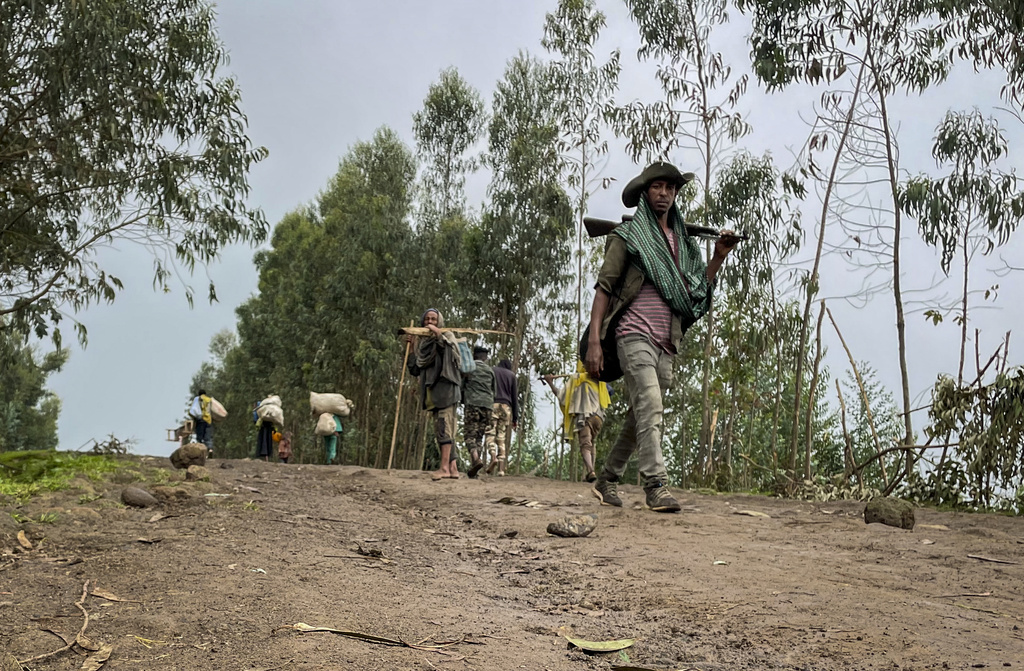Could Another War Be Brewing in Ethiopia?
ADF STAFF
Nine months after a peace deal ended Ethiopia’s two-year conflict in its Tigray region, another violent confrontation is intensifying in the Amhara region.
Fighting broke out in early August between the Ethiopian National Defence Force (ENDF) and Fano, an ethnically Amhara militia that allied with the ENDF during the Tigray war.
After Fano fighters seized some towns and districts, the federal government declared a six-month state of emergency on August 4.
Temesgen Tiruneh, director-general of Ethiopia’s national intelligence service, was appointed to oversee enforcement of the state of emergency.
“This robbery force is operating with the goal and intention of overthrowing the regional government by force and then advancing to the federal system,” he said August 6 on state-affiliated Fana Broadcasting.
The state of emergency banned public gatherings and carrying guns or sharp objects. It gave security forces power to impose curfews, restrict movement, make arrests and conduct searches without warrants.
The government also can close or limit the movements of media outlets it believes are operating contrary to the emergency orders.
Tensions rose in the wake of Ethiopia’s peace agreement with Tigray, which restored some historically disputed territory to Tigray, which some Amharas denounced as a betrayal.
Fano has made no secret since then of its desire to see Ethiopian Prime Minister Abiy Ahmed ousted.
Many Fano militiamen believe the government wants to take their weapons and leave them vulnerable to other armed groups, according to Hassan Khannenje, director of the Horn International Institute for Strategic Studies, a Kenya-based think tank.
“The Amhara militia fought alongside the government against the TPLF, and they managed to get a lot of land and expanded their reach beyond their traditional borders,” he told Anadolu Agency.
“So they fear that the current relations between the [Tigrayans] and government might work to disadvantage them, not only in terms of economy but also security.”
According to the Armed Conflict & Location & Event Data Project, nearly 30 clashes occurred in the first week of August in Amhara, the country’s second-most-populous region.
“Persistent insecurity in Amhara poses a significant threat to the federal government, the Abiy administration, and Ethiopia’s stability at large,” the conflict monitor wrote in an August 10 analysis.
Violent protests took place across Amhara in April after Abiy decreed that security forces from Ethiopia’s 11 regions would be integrated into the national army or police.
After rising to prime minister in 2018, Abiy has tried to centralize power. Since 1991, Ethiopia has been an amalgam of semiautonomous ethnic states that often are in conflict with one another.
During the Tigray war, when fighting had spread into Amhara, a United Nations report said, “hate speech attacking and dehumanizing ethnic groups, a key indicator of future atrocity crimes, shows no sign of abating.”
On August 8, the ENDF, along with riot police and pro-government militiamen, regained control of Gondar, Amhara’s second-biggest city.
“It was intense fighting,” a Fano fighter told Reuters. “ENDF was using tanks. Our fighters were just using Kalashnikovs.”
The ENDF, however, drew swift rebukes after an August 13 airstrike in the town of Finote Selam killed at least 26 people.
The next day, the Ethiopian Human Rights Commission expressed “grave concern” over the fierce fighting in Amhara this month, and condemned a wave of arrests of ethnic Amharas.
The independent state-affiliated organization said the use of heavy artillery had resulted “in the deaths and injuries of civilians” and that fighting “continues in other parts of the region and remains a major concern until a sustainable solution is in place.”
Khannenje said the government seeks to restore control over all of Ethiopia. Abiy’s goal is to forge one united army, by force if necessary.
“You cannot have mini-armies within one country,” he said. “It has never worked historically.”


Comments are closed.